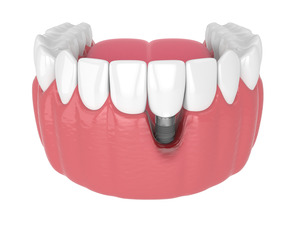
While dental implants have a very high success rate, there’s a chance that they could fail either shortly after being placed or much later down the line. If you want to protect your newly rebuilt smile, then you need to be able to recognize the warning signs of dental implant failure so that you can take appropriate action. Below is a quick look at possible symptoms that could point to an issue with your dental implants – as well as how you should handle the problem.
What are Some Signs That Dental Implants Have Failed?
Regardless of whether you’re experiencing early or late dental implant failure, you will generally notice the same kinds of symptoms. Some common warning signs include:
- Mobility: Once a dental implant post becomes fully integrated in your jawbone, it should always stay perfectly still. If you can move it, then something has gone wrong. You may even notice it moving when you’re trying to chew your food or speak to others.
- Infection: Sometimes dental implant failure is due to an infection of the tissues around the post. Possible symptoms of an infection include swelling, pus, bleeding gums, and a fever.
- Severe Pain: Failed dental implants are often accompanied by significant oral pain. Note that this pain will be more severe and/or last longer than the discomfort that normally occurs in the days following dental implant placement.
What Should You Do If Your Dental Implants Fail?
It goes without saying that a failed dental implant is not a problem that will take care of itself over time. As soon as you think there’s something wrong with your implant post, you should get in touch with your periodontist. Once they have examined your mouth, they can determine what caused the failure in the first place and create a treatment plan.
How Can Dental Implant Failure Be Prevented?
You can significantly reduce your risk of ever experiencing dental implant failure simply by taking proper care of your implant posts. This means taking the following steps:
- Brushing and flossing thoroughly at least twice a day.
- Keeping up with your regular dental appointments.
- Staying away from cigarettes and other tobacco products.
- Promoting the health of your jawbone by eating plenty of foods that are high in calcium.
- Breaking bad habits that can damage dental implants, such as crunching ice.
You don’t need to live in fear of dental implant failure, but you should always be aware of the possibility. Be ready to act immediately if you have any reason to believe that something has gone wrong with your dental implants.
About the Author
Dr. David Handsman earned a Master of Dental Surgery in periodontology at the University of Tennessee. At his Worcester practice, Handsman & Haddad Periodontics, he not only places dental implants to replace any number of teeth, but he also offers salvage options for dental implants that have failed. To schedule a consultation with Dr. Handsman, visit his website or call (508) 753-5444.

